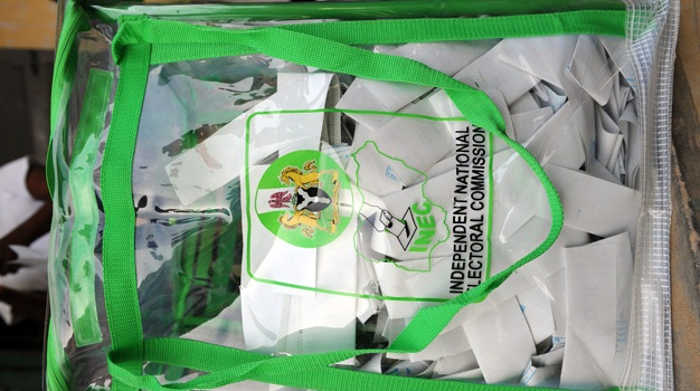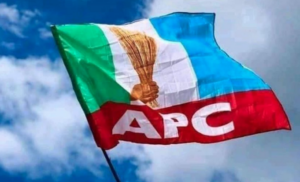
A ballot box filled with ballot is pictured before being counted by the Independent National Electoral Commission (INEC) at a polling station in Yenagoa, in Nigeria's Bayelsa State, on April 16, 2011, after Nigeria's crucial presidential election and a bid by Africa's most populous country to hold its cleanest polls for head of state since the end of military rule. AFP PHOTO / PIUS UTOMI EKPEI
By Sunday Eze
Efforts to get justice and overturn the victory of President Bola Tinubu of the All Progressive Congress (APC) at the February 25 polls by Peter Obi of Labour Party (LP) and Atiku Abubakar of the Peoples’ Democratic Party (PDP) finally ended in fiasco at the Supreme Court. The apex court as envisioned simply toed the line of the lower tribunal, upheld the election of Tinubu and dismissed the appeals of both petitioners for lacking in merit. What this implies according to the seven-man Justices led by James Iyang Okoro was that the election was free, fair, credible and had substantially complied with the electoral laws, guidelines and the constitution of the federal republic of Nigeria. The summary of the judgment in a layman’s language means that challenging the declaration of Tinubu as president was simply a waste of time.
Some salient questions deserved to be raised at this juncture of our national political and economic life. Was justice really done in both tribunal and the Supreme Court judgments? Is the judiciary still the last hope of the common man? Have we really played strictly by the rules and the tenets of democracy as a nation? We are all Nigerians and we knew how desperate and manipulative politicians could be when it comes to winning in any elections. No matter the outcome of the verdict, we are all casualties together with the judges, their families and kinsmen either living in bubbles, pretending, enjoying or suffering the consequences of our decisions. The judges are Nigerians who knew quite well that the election was not credible but relied on technicalities to deliver the all-important judgments. If a seven man panel of selected judges occupying a privileged position think, a man with alleged questionable character, forged certificates, age and gender who emerged winner in a fraudulent election is the best for Nigeria, then, so be it.
However, Peter Obi was the hero of that election while the Independent Electoral Commission (INEC) and its accomplices were the villains. It was said that every idol has its unique sacrifice and they all got theirs in line with their uniqueness. Obi brought into the foray of politics sagacity, sophistication, intelligence, tact, statistic and ease. Atiku on the other hand is no longer coming at the moment as many of his supporters envisaged. But the truth regarding the authenticity of the gender, age, name and certificates, transcript belonging to the president and the one submitted to INEC now in the public space was made possible by Atiku. One can now freely access and interrogate them. The 2023 presidential election petition has offered Nigerians the opportunity to unveil the long hidden identity crisis surrounding the persona of Bola Ahmed Tinubu. Atiku Abubakar should be commended for enriching our democratic space by seeking further evidences to support his case at the Supreme Court from Chicago State University (CSU) which furnished him with documents related to Tinubu’s certificates. Today, the world has been feasting on the outcome of that legal process.
More importantly, the hullabaloo surrounding the elections notwithstanding, some lessons deserving of improving democracy were learned. First, the way politics is played is no longer the same. A new narrative of seriousness anchored on character, competence and capacity has been introduced. The culture of taking Nigerians for granted and anointing candidates or determining who wins even before the polls failed to work. People were determined to make a difference as they stood against intimidation, deception and manipulation of citizens by politicians. Those aspiring for positions of leadership unlike before now know that they have to account for their stewardships. Many are beginning to understand what it means to elect leaders. Second, the myth surrounding huge voter population in northern Nigeria especially North West deliberately orchestrated to rig elections was conquered by technology. Before 2023, the manipulated figures churned out of the North West especially Kano at the end of every election is always mind boggling.That has been demystified.
Third, money politics was roundly decimated and defeated. Peter Obi discouraged the propensity of using money as a tool for gaining political momentum by enlightening the people on the danger. People were made to realise that gifts or handouts shared during campaigns to citizens are fruits of slush funds stolen by politicians and deployed to momentarily entice them but still keep them in perpetual poverty. Fourth, issue based campaigns took the centre stage unlike before. Nigerians desire fundamental changes in the polity and the idea of taking Nigeria from a consumption to a productive nation took the lead. The message resonated across Nigeria. It represented the reality and was provided as a solution to our problems. Fifth, the overall level of citizen’s political consciousness was raised. Many became aware of the power and value of their Permanent Voters’ Cards (PVCs) as a weapon of change. People understood that their votes can make or mar politicians. Citizens drove the conversation and pull the strings in their communities and various media platforms. Especially among the youth who are tired of the old corrupt order, it was time to take back Nigeria.
Finally, the Electoral Act 2022 as amended was an important factor which shaped the outcome of the 2023 elections. It introduced the kind of transparency we have and needed now to clean up the electoral processes. The curtailed excessive rigging and sanity to a large extent was brought to bear as a result. The 2023 general elections had clearly shown that the discretionary powers granted INEC on deciding which guidelines to adopt in elections is not in the interest of free, fair and credible polls or in tandem with the intendment of the Electoral Act as amended. Therefore, the law or guidelines should be reviewed without further delay. Motion for the amendment of the Constitution should also be set to define in clear and unambiguous terms basic requirements of candidates for various elective positions. Politicians especially Atiku, Obi and the Obi-dients should keep all political grievances behind them, work and plan strategically towards 2027 elections. For Obi, construction of new bridges and building of alliances should begin in earnest especially with the North and South West, Atiku should concentrate on South West and East if he is interested in contesting again while APC should seek more presence in South East and South-South. Both Obi and Atiku could also work and collaborate together in any mutual ways possible for victory in 2027. The existing structures of political parties should be rejigged and new blood infused into them for optimal performance. Parties in crisis should mend their fences and form a common and united front or continue to fail. The tendency to play politics with religion and ethnicity should be avoided.
There is no shame in contesting an election and losing gallantly.There is also no shame in trying more than once. Abraham Lincoln lost all the elections but one. Buhari contested four times before he finally won. Politicians and their supporters should see politics as a call to service. All contestants and their supporters aspired to work for a better Nigeria. In the end one man must win and one man has finally won no matter the circumstances. The reality on ground now is that Tinubu has survived virtually every major political or legal obstacles stopping him from completing his four-year tenure. The next general elections is around the corner. Therefore, political parties should go back to the drawing board. They should leverage on their strengths and properly diagnose their challenges and weak linkages leading to poor performance with a view to remedying the situation. Now is time to focus on preparations for the 2027 elections.
Sunday Onyemaechi Eze, a Media and Development Communication Specialist writes via sunnyeze02@yahoo.com




Hi, I do tbink this is a gdeat website. I stumbledupon it ;
) I mmay come back once again since I book marked it.
Monjey andd freedom iss thhe greatest way too change, may yoou bee rich and continje to hlp others.
陈晓《大生意人》2026古装商战大作,海外华人免费高清陆剧,权谋与情感并重,全球加速无广告高热度追剧。